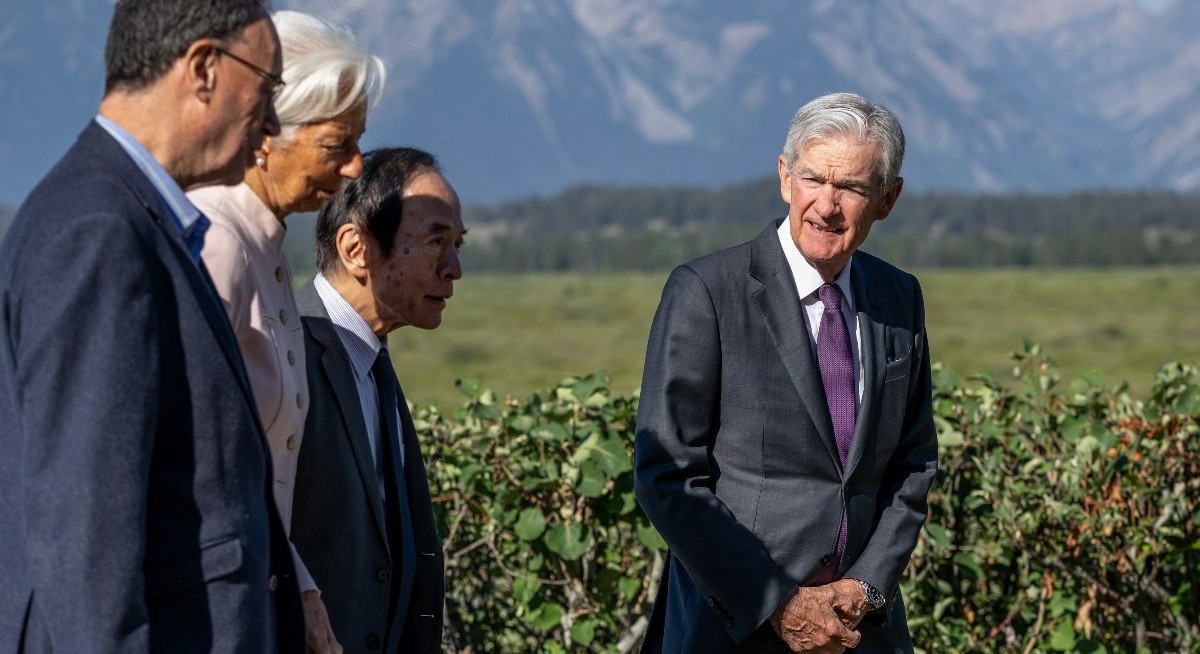Here’s what analysts and strategists had to say:
Gerald Gan, deputy chief investment officer at Reed Capital, Singapore:
“Asian equities across the board will certainly be boosted if expectation of a cut rise further as the September FOMC approaches.”“As long as the appreciation of Yen is moderated, it will not be too problematic towards Japanese risky assets.“With the BOJ closely monitoring the yen, I do not see a high yen volatility moving forward and once again, that means Japanese equities will likely be net higher into next year.”
Priyanka Kishore, principal economist at Asia Decoded:
See also: BofA says anything-but-dollar trade to lift international assets
“A weaker dollar would temporarily lift Asian currencies with Powell signaling a September rate cut. But unless the Fed commits to a deeper easing cycle, any rally is likely to be short-lived.”
Hebe Chen, analyst at Vantage Markets:
“Powell’s wish-to-reality signal is set to serve as glue on the cracks beneath Asia’s mildly shaking markets. While it offers no guarantee of permanence, the uplift should be most evident in tech-heavy sectors and markets (i.e., Japan and Taiwan) where sentiment is more fragile. For investors, this fresh dose of optimism is likely to keep risk appetite buoyant through to September 17.”
See also: Stocks tumble as risk mood sours, gold rebounds
Jamie Halse, chief executive officer at Senjin Capital:
“This is likely positive for global markets in the short term, as it implies capital leaving the US for better return opportunities elsewhere, and a falling dollar.”“Lower rates generally make USD investments less attractive if rates elsewhere stay the same. That’s why the USD usually falls when US rates fall.”“Weaker US rates, combined with Ueda’s still-hawkish tone, implies a strengthening JPY versus the USD. This hurts the earnings of large-cap exporters and those with sizable profit-pools overseas, but benefits smaller-cap domestic-facing businesses with USD denominated inputs. ”
Anna Wu, cross-asset strategist at VanEck Associates:
“Powell’s speech is dovish, removing the block for a September rate cut and boosting risk sentiment. This is supportive for equities and short-term bonds.”“Japanese equities will get a boost, in my view, due to sentiment improvement. But Nvidia’s results and PCE data will be key this week, to test if the rally can endure.”“The yen could strengthen a little against the dollar, as Jackson Hole helped yields.”
Tim Waterer, chief market analyst at KCM Trade:
“The Fed Chairman sounded dovish rather than defiant at Jackson Hole, which was music to the ears of risk assets.”“The prospect of lower US rates could prompt investors to search for yield elsewhere, which could bode well for Asian economies.”
Marito Ueda, head of financial market research at SBI Liquidity Market:
To stay ahead of Singapore and the region’s corporate and economic trends, click here for Latest Section
“Powell’s speech seems to acknowledge a rate cut in September, but he is not that dovish, saying that it will depend on the data. The dollar-yen rose because the market expected hawkish comments, so it has fallen back by that amount.”“I don’t think the dollar-yen exchange rate will break out of its range.”
Kazuya Fujiwara, fixed-income strategist at Mitsubishi UFJ Morgan Stanley Securities:
“JGB prices are likely to remain firm in line with lower US interest rates, but upside potential is limited due to expectations of a Bank of Japan rate hike and concerns about fiscal expansion.”“Governor Ueda’s statement during the panel discussion that ‘upward pressure on wages will continue’ is likely to be interpreted as a message that the Bank of Japan will continue to raise interest rates.”
Yusuke Matsuo, Mizuho Securities senior market economist:
“There is a high probability that the Bank of Japan, which is exploring rate hikes, and the Federal Reserve, which is exploring rate cuts, will have opposite policy rate directions.”“The foreign exchange market is expected to move gradually toward yen appreciation and dollar depreciation, reflecting expectations of one more rate hike by the Bank of Japan this year and two rate cuts by the Federal Reserve.”
Steven Englander, head of global G-10 FX research at Standard Chartered:
“Powell would not have given that kind of speech unless he thought it was very likely that the FOMC would cut rates. It is pointless to raise expectations and then disappoint. For markets the question is how high NFP would need to be to derail a cut, and how low it would need to be to justify 50 basis points.”
Billy Leung, investment strategist at Global X Management (Aus):
“Powell’s dovish signal at Jackson Hole revived risk appetite and fueled rotation into cyclicals and small caps, but for Asia the bigger catalyst will be heavyweight earnings. We could see some selling into the strength with results peaking.”“I would lean to likely fade into strength for today or into this week mainly as we are entering Asia’s busy earnings week.”
Katsutoshi Inadome, senior strategist at Sumitomo Mitsui Trust Asset Management:
“Across Asian markets, we’re seeing a shift toward risk-on sentiment in response to expectations for Fed easing. Equities have jumped, and commodities like oil and gold are being bought as well. This is all part of the market starting to price in U.S. rate cuts.”“In bonds, that same risk-on tone could trigger some upward pressure on yields. But in the end, it depends on how each central bank responds.”
Chetan Seth, Asia-Pacific equity strategist, Nomura Holdings:
“In Asia-ex Japan, we see better risk-reward in laggard ASEAN-4 markets tactically where Fed rate cuts should provide greater support for ASEAN-4 Central Banks to embark on their growth supportive rate cuts.”“We note that the Bank Indonesia already surprised markets this past week with a surprise 25bp rate cut, and our ASEAN economists expect more cuts ahead in Indonesia, the Philippines and Thailand.”




